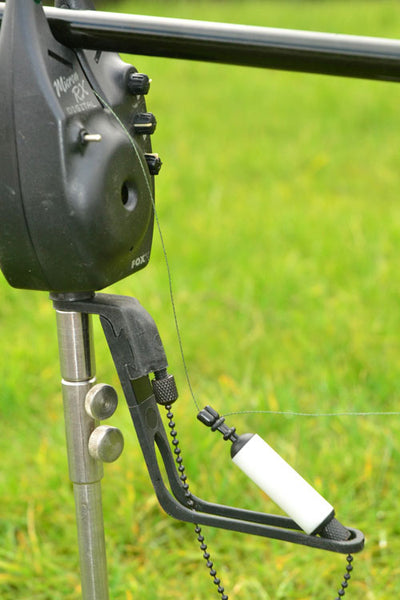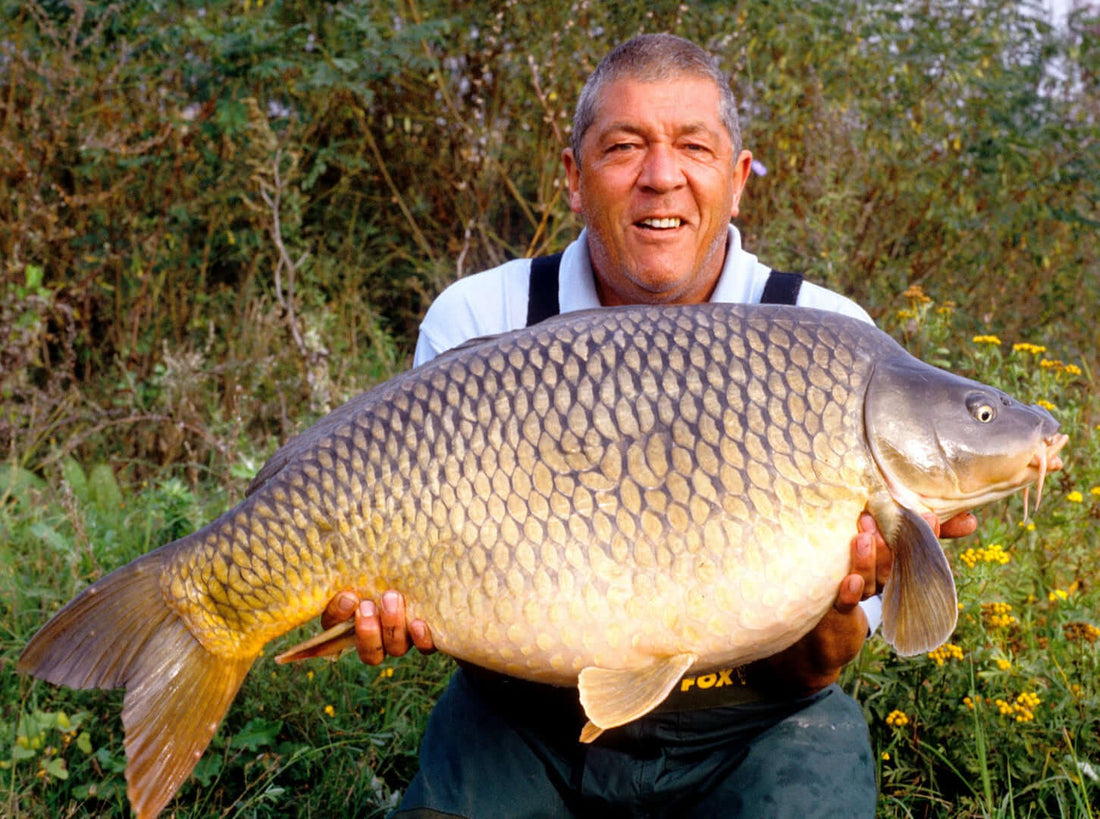First of all let me set out what I mean by the word 'educated'. Clearly carp cannot be taught to solve complex equations, summarise Proust or decipher signals from outer space…BUT, they can learn from experience both negative and positive. OK. a carp is a primitive creature with a brain the size of a pea and they most certainly aren't MENSA candidates

On certain venues angling pressure definitely has an effect and limited though it may be, the carp's brain is capable of learning from negative experiences, such as getting caught!
A carp can also learn from positive stimuli such as the feeling of safety it gets when it sits in snags or in an out-of-bounds area. The fact that they know that they are safe in a roped off area, for instance, shows that carp can learn by association.

Here is the proof. In this photo you can see about a dozen fish mooching around behind a rope that has been installed to stop anglers from fishing in the fierce snags you can see at the upper left hand corner of a small bay. Over the years trees have fallen in the water and they now provide excellent cover and a degree of safety for the carp that inhabit the lake. However, the sight of a few carp sitting in the snags is like a red rag to a bull for some who cannot resist the temptation to cast into the snags with not a hope in hell of ever extricating a hooked fish! To counter these idiots the angling club that owns the lake have added protection for the carp by roping off the snags to stop so-called 'anglers' from casting into them. Clearly the carp soon discovered this sanctuary, as this photo shows.

A similar situation used to exist when the UK enforced a Close Season for coarse fishing from 15th March - 15th June every year. This is now abolished on many lakes but here and there lake owners and clubs still maintain the three month break - and good for them, I say. As yet more proof that carp can learn by experience take a look at these three large carp taking floating dog biscuits with gay abandon tight to the marginal reeds on a well know venue that still has a close season. This pic was taken towards the middle of May. Come the 16th June you would not see them for dust! Yes, they know when the close season is over, alright!
Anglers constantly betray their presence and carp react accordingly. If only more of them would follow the advice of the father of modern carp fishing Dick Walker who wrote: 'study to be quiet'.

It is a fact that some carp react to such pressure faster than others and generally speaking the smaller the water the faster they wise up to the presence of anglers on the bank. This in turn causes them to become more cautious of baits, rigs and bait carpets as areas where they can go to escape the threatening presence may be few and far between. Consequently, on a lake such as this one in the photo the carp spend much of their time in the relative safety of the lily pads.

On small waters tight lines stretched across the lake is without doubt the single most contributory factor in creating nervousness in the carp in the lake, and one of the easiest ways to reduce this tension is to use slack lines, more of which in a moment. Here is a typical scene from the late 80s when we all fished with bar taught lines. I am sure these were seen by the carp and after a time they came to recognise these as signifying a dangerous situation. ON a small lake near my home I have actually seen carp cruising calmly just under the surface, seemingly without a care in the world. Suddenly, whoosh! They are off, spooked by the tight lines.

In large waters carp are far less likely to become educated as they can simply move away from suspicious areas or when they detect the presence of anglers. On huge lakes I don’t think carp are caught enough times to ever become educated, in the same way as those in smaller waters, but there is no escaping the fact that the negative associations of getting caught must remain in the carp's memory for some time. It all depends if they can link, say, a certain attractor with being caught. I think that is stretching it a bit! This carp was caught from a 12,000 acre lake and for all I know this might have been the first time it had ever been caught. It certainly didn't seem to recognise any of the usual danger signals - large bait carpet, tight lines, heavy leads crashing in on top if it, etc.

I feel that today’s anglers are often guilty of grasping at the latest ‘Super’ rig before they have tried far more simple set-ups. If you go in at the top of the tree, where do you go when even that stops working? It's far better to start off with the simplest of set-ups, bating patterns etc, and only change rigs etc. when you feel that the fish are becoming suspicious of the basic set-up.

Nowadays my own starting point is a slack line approach using the lightest lead I can get away with given the range at which I might have to fish.

Where possible I will use a pendant (hang down) lead of between 35g-50g, attached to a run ring via a weak C-link that allows the lead to pull free in the event of it becoming snagged. Enterprise Tackle offer a kit called the Snag-Safe Lead System, which is very effective, and Gardner Tackle sell the C-links as a separate item.

This close up shows the Snag Safe System.

When correctly set up the lead will be discharged should it catch in the bottom or in thick weed.


At this point I must warn you that fishing light running leads on ultra slack line is ONLY effective it you are using a main line of either heavy Fluorocarbon such as Gardner Tackle's 16lb b.s. Mirage Fluorocarbon main line, or a proper sinking braid like Gardner's Hydro Sink. This combines a high strength Dyneema core with a woven Kevlar fibre over wrap, which creates a super strong braid that sinks superbly. Mono lines generally are far too light to sink correctly and are badly affected by any undertow or cross flow that may be present. That said, I am hearing a lot of praise being heaped upon the new Berkeley CM90 monofilament main line which its proponents claim is ideal for slack line fishing. I have yet to use it but may well give it a try soon.
I think a lot of anglers think that a degree of tension on the line at the indicator is essential, otherwise how do you detect drop backs? they ask. Simple answer: Properly set up with a light running lead fished on fluorocarbon or sinking braid main line you just don't get drop backs!

I like to use light indicators/bobbins and the set up in this photo is ideal for slack line fishing. The indicator is a Gardner Bug and it is supported by the Gardner Bug Cradle. This allows you to fish slack lines without your bobbin chain/cord laying on the floor where it can easily get tangled, trodden on or even attacked by rodents.

Anglers on the bank often look at my set up in amazement as my lines are fished ultra slack, usually handing straight down from the tip ring. I appreciate it can take something of a leap of faith to fish thus, but trust me…It works.
Pressure effects carp in many different ways. On one water they may spook off big beds of bait, on others they won't consider anything else. I have always been a big fan of the 'one fish at a time' strategy that I have employed at le Queroy for some time now. It is a tactic I picked up from Bill Cottam back in the early 90s when we fished the Commons Lake together. I use hemp seed, sometimes mixed with groats, and keep the boilies to a minimum. A quarter of a pint of Haith's Large Hemp seed (now available to order for the first time), a few pinches of high attract paste, some Frolic biscuits and maybe a dozen boiled baits is sufficient to catch one fish. It's then just a matter of repeating the process again until you catch another fish, etc, etc.

I don't think there is a carp angler alive that does not consider hemp seed to be the best micro seed bait on the planet! Haith's have enjoyed a great reputation for supplying the very best, freshest seed available and this new extra large seed takes this to another level. You can judge just how much bigger the seeds are by this photo.


Bigger seeds mean more hemp oil and this is without doubt a high class attractor carrying as it does the tiny particles of the inner heart of the seed into the water table. Talking of which, no matter if you use the standard or the large hemp seed both can be enhanced still further by the addition of an ounce or two of neat Robin Red, or Liquid Robin Red.

We have touched upon the use of ultra high attract hookbaits before in this blog and there is no doubt that elevated levels of attraction can trip up even the spookiest of carp. I have caught hundreds of carp on alternative, boosted hookbaits from these two companies, Nutrabaits and UB Baits. The latter is the brain child of Matt Powles, a pop-up wizard to rival Harry Potter at his best. Matt's bespoke hookers are superb, they stay buoyant for as long as it takes to catch a carp - days if necessary but it seldom is - and in the two years I have been using them I have caught three PBs and countless other big carp. They are perfectly rolled and flavoured with some of the best attractors in the business from companies such as ABS, John Baker and other top brands. You can see for yourself just how well Matt rolls a bait.

Attraction comes in many forms and while commercial attractors are hugely effective, some of the natural ones are equally good. Green Lipped Mussel Concentrate is just such a product. Try this little trick to fool educated carp. Dip the hookbait in the lake and then while still wet into a pot of GLMC. It's almost unfair on the carp.

Educated carp can frustrate and drive you to distraction but even the craftiest carp in the land can still have a momentary lapse of reason and trip up on a well laid trap. This big old girl from Le Queroy is a case in point.



